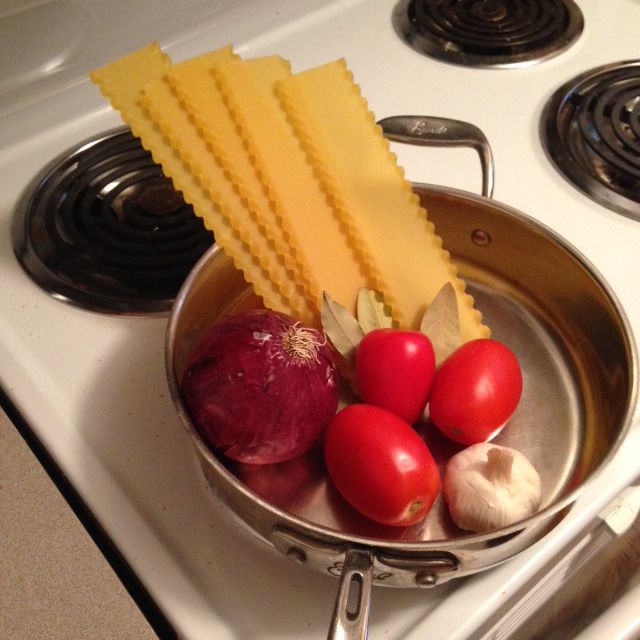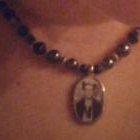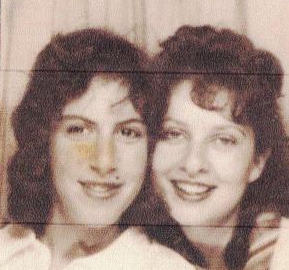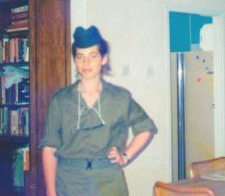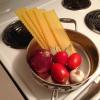I will make her lasagna. It’s her favorite, what she asked for almost every birthday. I bustle around the kitchen, gather Italian sausage and smooth mozzarella cheese, crinkly lasagna noodles. I whiff the oregano, thyme, and lovely basil, swirl the deep, dark and heady balsamic vinegar. Waiting their turn are ruby red tomatoes, purple red onions, shiny green peppers – the colors of Christmas and Lent, joy and sorrow separate on my counter but indistinguishable in the sauce. Crusty, dense bread that will be slathered and baked with rich butter and garlic. And chewy chocolate chip cookies.
If it were just me, I’d have Cheerios or Apple Jacks, but the first night of Christmas break after four finals, a girl should have a hot, hearty meal. She spent most of Thanksgiving break with her dad. On Saturday night, she cruised to my house about nine. We talked for a few hours before going to bed, then after a quick breakfast of bagels and yogurt, she was gone.
I always use the same skillet. My victory skillet. The one I bought when I was married to her father. I had a non-stick skillet, but I wanted a heavy-duty stainless with a glass lid. I dreamed about even cooking, a skillet bottom in which the juices wouldn’t run to one side. When I asked him for a new one, he told me when the old one fell apart, then I could get a new one. That old one was good enough for now, he said. When he bought himself a new shotgun when he already had two, I was told that was different. The next day I went to Bergner’s and circled the kitchen section for about thirty minutes. I went downstairs and stalked the purse and shoe section for another twenty, talking myself into buying the skillet. When I handed over my crisp twenty dollar bills to the clerk, my hands shook.
I hid it for about a week. I left it in the trunk of the car for a few days. Then on a day I knew he would be home late and while Olivia was at school, I took it out of the box, ripped up the packaging, and stuffed the plastic and cardboard in the outside trash can underneath a couple trash bags. I snuck it into the house, tucked under my jacket. I kept looking behind me as I ran into the house, as if someone were watching me, and I would be found out any minute.
It fit perfectly in my cabinet, nestled among the old. It shined even more against the dulled pots and pans so that I was afraid every time I opened the cabinet door, he would see its light.
Then one evening when the bourbon made him tipsy sooner than usual, I made dinner with it. He never noticed. I even left it dirty in the sink overnight, daring him to notice. Waiting for the “What the fuck? You went behind my back?” and the “I was going to get you a new set, but now you don’t deserve it, fucking bitch.” I had my comebacks ready, that I paid for it with my own money, that if he got new things, I should too, that it was just a skillet. I was ready.
He never saw it. I clanged it around getting it out of the cabinet and hit the side of it with a metal spatula more than I needed to. He never paid any attention. I ridiculed myself for thinking he would notice. But after a few meals had made with it and it still went unnoticed, I bought a few more things – a small resin cardinal I put on the kitchen window sill, a framed picture of an English garden I hung in the bathroom – both went unseen. The final test was to buy new drinking glasses, make his bourbon and water in one, and set it down in front of him. When he didn’t notice his glass was pale pink instead of clear, I celebrated. Now that I was invisible, I could leave.
I took the skillet with me when I left him. All I wanted from him was my daughter, my piano, my car, my dignity, and my skillet.
Tonight, I throw in some ground beef to make the sauce extra meaty, the way she loved it when she was ten. For her birthday that year, she requested lasagna. Because it was her first double digit birthday, we had a big party at our house. Red, yellow, blue balloons. Paper plates and party hats decorated with unicorns. Streamers across the back porch. Ten kids with noise makers, running and laughing and screaming around the back yard, the dog chasing them. They ate lasagna, garlic bread, chocolate chip cookies, cake, and ice cream. They drank and spilled fruit punch. After the kids left, she hugged me tight and said, “This was the best birthday ever.”
The next year she was a preteen, then she was a teenager and birthday parties increasingly were celebrated away from home. We had lasagna about once a month after that for a few years. Then, like the parties, as she got older, meals together became scarce as work and school and hanging with friends dictated our schedules.
As the sausage and beef sizzle together in the skillet, I chop onions and mince garlic. I always have cookie dough in the freezer, so while the meat is browning I scoop balls of chocolate chip dough on the cookie sheet. The lasagna won’t be done by the time she gets home, but the cookies will.
Taking a quick break, I pour myself a mug of coffee, extra cream. I’ve always been a coffee drinker, even in the summer. There’s something soothing about wrapping my hands around a warm, sturdy mug. I close my eyes and breathe in the comfort while the steam washes over my face. I usually drink about half, then set the mug down to finish what I was doing. By the time I get back to it, it’s cold. I top it off, and do it all over again.
On a shelf to the left of my sink, I have photos of her at different ages. A few grade school pictures, her soccer team in junior high, her high school graduation. I sip my coffee and smile.
When she pulls into the driveway, the sauce is complete, simmering. The cottage cheese, Parmesan mixture waits in the fridge. The water starts to boil. I slip the noodles into the pot and take the cookies out of the oven and slip the garlic bread in as she slams kitchen door shut. She carries everything in at once, not wanting to make more than one trip, and declined my offers of help. Slung across her shoulder is a backpack stuffed so full the zipper refuses to close. She carries a small, blue duffel she didn’t bother to zip up. Pink sleeves, orange skirt and black tights spill out. She has on a navy pea coat with two of the gold buttons missing, the same coat she wore two years ago during her last year in high school. Her silky brown hair is swept back into a ponytail held by a long, flowing purple batik scarf.
Even though she has her earbuds in, the angry girl band music of Veruca Salt spills into the house, overpowering my Bach Second Concerto. I smile as I remember when, during her sophomore year of high school, I drove her and a friend a hundred and eighty miles one-way to see this angry girl band at an outdoor festival. The ride there and back was longer than the concert several times over, but the girls bellowed the songs all the way up and all the way home. I recognize it right away.
She dumps the bags in the middle of the kitchen floor and hugs me in her typical way – quick and not too close. I pull her close, trying to hold her like my ten-year-old girl, but she slips away.
“My God, something smells good,” she says opening the fridge. “Got anything to eat in here?”
“I made lasagna and bread and salad and cookies.” I turn back to the stove and stir the sauce. I clang the spoon on the side of the skillet. “Just the way you like it.”
She pull out a hunk of cheese and a carton of yogurt. “I can’t eat the lasagna, but I can everything else.”
“What?” When she was in high school, I learned to speak her teenage mumble. Now she speaks like an adult, but I don’t understand. “What did you say?”
She peers back in the fridge. “It’s got meat in it. I’m a vegetarian now, remember?”
I grip the counter as the room tilts. I stare stupidly at her. This isn’t her. The girl who I took to the local burger joint after every soccer practice because she was “starving” for a cheeseburger and fries? The girl who every Fourth of July gobbled hot dogs and bypassed coleslaw and pickles and potato salad, proclaiming that food nasty?
“A vegetarian?”
“Yeah, you know.” She looks at me, tilts her head and speaks as if I’m a small child. “Veg-e-tar-i-an. People who don’t eat meat.”
“Yes, I know what it means,” I say. “When did this happen?”
“Mom, you say ‘when did this happen’ to people who get cancer.”
I wipe my now sweaty hands on a towel. As I hang it on the oven door handle, I say, “I wish you would have told me.”
“I did. You just didn’t listen.”
I turn to face her. “I would have remembered something like this. You didn’t tell me.”
“I know I did, but it’s okay. I love all your other food.” She popped a warm chocolate chip in her mouth and closed her eyes. “Oh my God, these are the best.”
“No, it’s not okay,” I said. Something was wrong, but I couldn’t make it right. Serving up hot food used to be the answer. Now my solution was the problem.
I search for my coffee mug. Not finding it, I get another one out of the cabinet. I fill it way too full. When I add cream, the hot brown liquid runs over the side of the mug and onto the floor. I jerk to grab a towel and knock the whole mug over.
“Shit,” I say, and nudge her to keep her from getting burned. I bend to mop up the spill, but it keeps flowing from the countertop.
“Mom, you have to wipe the top part off first or–”
“I know, I know,” I say and reach up to clean the sides of the cabinets. By now it’s all run down the cabinet. I mop up the floor.
“You had a mug right here,” she says, looking down at me.
She points at my skillet. “That’s starting to burn.”
She stirs the sauce while I stand up and try to regain my balance. I take the spoon from her, turn down the flame, and stir the meat sauce. It’s simmering from below. It swells, not yet hot enough to boil when the heat bursts through the surface.
“I’m going downstairs,” she says. “Let me know when it’s ready.”
“Ready?” I say to her disappearing back. “How the hell am I supposed to get meat lasagna ready for a vegetarian? What the hell am I supposed to feed you?”
She turns, her eyes wide. “What’s the matter with you?”
“Nothing. Just that my daughter stops eating meat and doesn’t bother to tell me until I’ve made her favorite food, or what used to be her favorite, and doesn’t bother to tell me until I’ve used all the tomatoes I have in the house and mixed them with meat and–”
“Mom, calm down. It’s only food.” She flees downstairs.
I look at the meat sauce in the skillet, now pulsing, breathing, bubbling giant craters that swell and spew red blobs, splattering on the white stove-top. Several fly up and sting my face. I shove the skillet off the burner and snap off the flame. I’ve never made it any other way. I don’t know what to do. I can’t make it be like it always was unless I start over. I can’t start over because I don’t have the ingredients. I can’t start over because she’s a vegetarian. I yank the oven door open. The garlic bread is still gooey, but I take it out and slam the cookie sheet on the counter.
I wrack my brain to remember any conversation with her about being a vegetarian. What did she eat the last time we went out to eat? I made lasagna for her high school graduation reception, and I know she ate it then. I see her in her unzipped graduation gown, holding a paper plate loaded with food. She’s waving her fork in the air, laughing with her friends. Before she and her friends leave for another reception, she grabs me and hugs me. “Thanks, Mom,” she whispers. “This was the best.”
The timer for the noodles beeps. I turn off the burner and lean over the pot to shut off the timer. Steam rises and fogs up my glasses. I leave the noodles in the hot water and stand there until my eyesight clears.
I lean against the counter and look at the carnage. The sauce splattered brownish-red blobs not only on the stove but also the counter and the floor. This I can clean and make it like it always is. But the girl downstairs, I no longer know. I’m a mom. I feed and nurture my child. Who is she, who am I now if I can’t do that? I have to find another way.
I wash my hands, splash cold water on my face. As I dry my hands and face, I look at the pictures of her on the shelf. All the crap the two of us lived through together – the drinking, the yelling, the belittling – both still standing. Surely we can get through food.
I go downstairs. She’s sitting cross-legged in a wingback chair at the far end of the room. A faded, blue and brown flannel blanket is draped around her shoulders, a blanket I made for myself that she ended up using more than I have. She’s on her laptop, earbuds in. She doesn’t look up. I don’t know if she’s heard me come in.
I slide silently into a side chair. I pick up a magazine and thumb through it. We need to talk. We need to sort this out. We need to go back to the way we were.
“What are you doing?” I ask, hoping I don’t sound interrogating.
She pulls one earbud out, holds it in the air, and stares blankly at me. “Huh?”
I repeat my question, to which she replies, “Trying to find a movie to go to,” and puts the earbud back into her ear.
“What movie?”
She pulls the earbud out again. “What? Oh, something you’ve probably never heard of.” Earbud goes back in.
I look at my magazine, but it’s out of focus. I blink my eyes to clear them, but my hands are shaking and my head whirling so I can’t see.
“What do you want for dinner?” No response. “Olivia?” She continues to stare at her computer, takes out one earbud.
“What?”
“Dinner. Anything special you want?”
“Nope,” she says, puts the earbud back in. “Anything is fine.”
“As long as it doesn’t have meat in it,” I mumble. “I don’t know what to do,” She smiles at her computer screen. Does she not hear me? “I don’t know what to do,” I say louder.
She glances up, this time not removing the earbud. She shrugs. “Figure it out. You always do.”
I laugh softly to myself. I stare at the floor in the space between us. Mothers never figure it all out. We pretend, all the while knowing that mother guilt is passed through the umbilical cord from child to parent as surely as nutrients flow to the child. Mother of only-child guilt lurks and circles, a fox biding its time, studying vulnerabilities, striking with sniper precision, and then retreating. Divorced mother guilt courses through veins, a natural metal like magnesium, and has a force stronger than gravity. I bear the crown of all three, the trifecta of guilt. I thought I could earn my salvation. I laugh at myself.
“Mom,” she says, whipping out her earbuds and dangling them around her neck. Guitar and drums, girl voices singing, “Can’t Fight the Seether” rocks my family room until she slaps the laptop closed. “It’s okay, Mom. I’ve got it. I’m meeting Lindsay, and we’ll grab something while we’re out.”
I sit still until I hear the back door close. I stand, straighten my pant legs, smooth my sweater, and head upstairs. I drain the cold, starchy water off the lasagna noodles. I dump them in the skillet with the congealed meat sauce. I pull the cheese mixture out of the fridge and plop it on top of the noodles. I top it off with the soggy garlic bread. I put the lid on the skillet and smash it down until meat sauce oozes out the sides.
I carry the skillet outside under the clear, starry night. I carry all the meals I’ve cooked in it, those relished and those snubbed. I carry the fear I bought it with, the hurt I received from him over it, the covert freedom I grabbed with it, and the good mother illusion I made up with it.
When I throw the skillet into the empty trash can, it rocks gently back and forth, unsteady on its wheels. The skillet bounces on one side, the other, and then it settles with a sigh.
I close the lid and walk back into my house. I turn up the volume on Bach’s Mass in B Minor and pour myself a bowl of Apple Jacks.
Jane Stevenor can be found in Huron, OH where she lives with her husband and their long-haired miniature dachshunds. Yes, she has become the woman she used to make fun of. No dog in her purse. Yet. She teaches Freshman Composition at a local community college and at a branch campus of a state university. She writes about whatever catches her fancy, as evidenced by her piece that received Runner Up in Alfred Hitchcock’s Mystery Magazine Mysterious Photo Contest. Her education is just as eclectic as she holds a BS in Nursing and an MA in English. Her current project is a cozy mystery novel.
